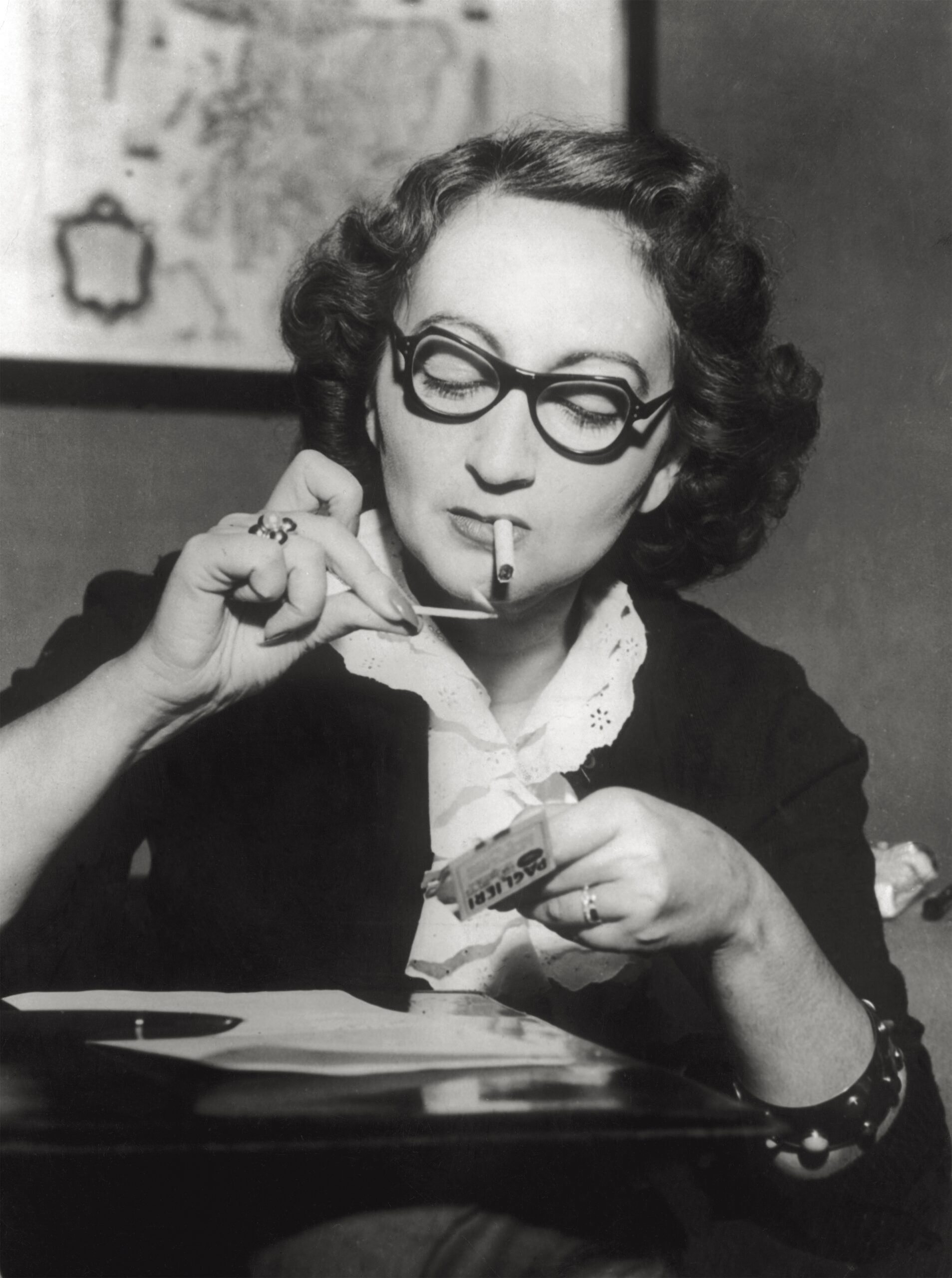
Nessuno torna indietro
Alba de Céspedes (1911-1997) married at fifteen, became a mother at sixteen and divorced by twenty. That’s when she started her writing career, working as a journalist, novelist and editor. She was jailed twice for her activities in the anti-fascist movement. Her novel There’s No Turning Back was an instant bestseller when it came out in 1938 as Nessuno torna indietro, and was subsequently banned by the Fascist authorities. The book revolves around eight young women in a college run by nuns in Rome; the girls are from different backgrounds, but share their hopes for the future. What follows is the first chapter from the English translation by Ann Goldstein, published by Pushkin Press.
As the nun read the last words of the evening prayer, an indolent chorus of girls responded: « Amen. » Silence followed, veined with impatience. Some of the girls stared, transfixed, at the lighted tapers on the altar, others turned toward the back of the chapel, waiting for a sign from the Mother Superior to release them. Eager to leave, they didn’t even talk to one another. Soon afterward they filed out, two by two; in a compact column, they crossed the wide hall, where daylight lingered on the opaque glass of the front door.
They were grown-up girls, dressed in a variety of ways; near the stairs, as if at another signal, they threw off their veils and relaxed. Suddenly, the silence became a dense chatter; subdued laughter grew gradually more open and bold.
They talked about the university, the professors, some exchanged whispered confidences. One of the nuns, clapping her hands lightly, said: « That’s enough, girls, enough, go to your rooms. » She was the only sister the girls didn’t dare talk back to. Besides, she wasn’t a sister like the others; tall, slender, and still young, she had a melodious voice, slim white hands. When she spoke, the girls stopped to think, and meanwhile, involuntarily, obeyed.
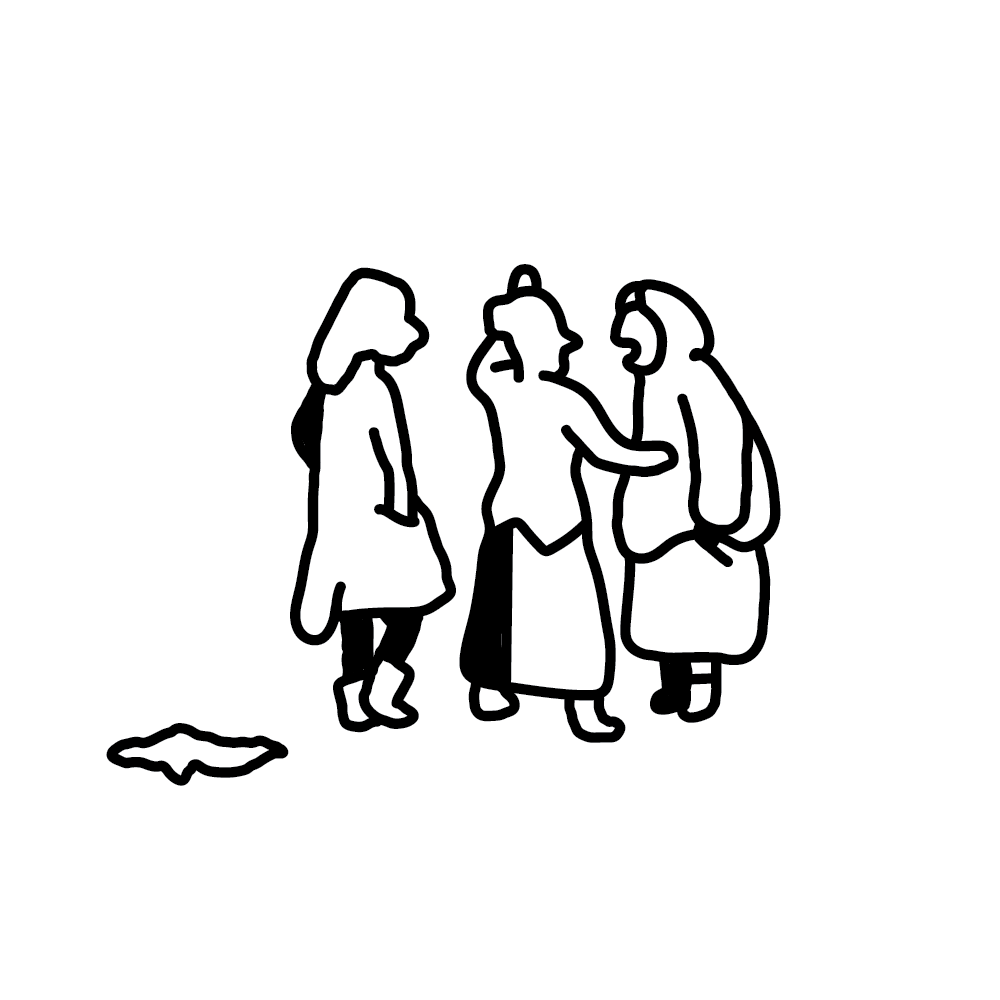
Right away they started up the stairs; only Vinca delayed, asking as she did every evening: « May I use the phone, Sister Lorenza? »
Her closest friends turned to hear what would happen; Valentina pulled her by the sleeve so hard she made her stagger.
« It’s late tonight, Vinca; you’ll call tomorrow morning. »
« But I… »
« Tomorrow morning, I said. Now go to sleep or to study. Good night. »
Gathering around, her friends snickered: « Bad luck, you failed. »
« She does it because she’s angry, » Vinca replied, « because she’s shut up in here. It doesn’t matter: I’m sleepy, I’m going to bed. »
« I’m tired, too, » said Augusta. She was at least thirty, the oldest of the students at the Grimaldi: tall but heavy, her curly black hair cut like a mop. She said good night to the nuns, took Vinca by the arm, and they set off.
At the same time a plump blonde moved quickly among the girls, whispering to some of them: « We’re meeting in 63. »
These gave brief, wary nods. Then they faded into the shadows of the long corridors and disappeared into their rooms.
Room 63 smelled of stuffed dried figs; they were sent to Silvia from Calabria in large baskets that she put on top of the wardrobe: anyone who wanted some could climb up on a chair and fish around in the basket. Silvia, lying on the bed, seemed to be asleep. Ever since she’d arrived at the Grimaldi, three years ago now, she had worn mourning. She had dull black braids wrapped around her head, an olive complexion, and dark, slightly squinting eyes under heavy lids that shone as if they’d been oiled.

Because of the black garments hanging on the walls, mourning clothed the room as well; the girls often gathered there after dinner to study. Really they would have liked to go to bed, to sleep: overcoming that desire took an effort. Only Xenia was always awake. She decreed: « Let’s go, » and the others didn’t dare refuse.
Are you asleep, Silvia?
The lamp hung low over the table where Valentina was reading, numbed by the cold; it was mid-November, and the weather seemed to predict a frigid winter. Putting down the book, she turned toward the bed and asked: « Are you asleep, Silvia? »
« No. I’m thinking. »
« You were sleeping… »
« No. I was thinking how tomorrow in my village there’s a big celebration: my mother makes a raisin cake, a big log burns in the hearth, and the cousins come to our house to eat. »
« Do you wish you were there? »
« No. » Then she added, uncertain: « That is, I don’t know. Tomorrow, yes. For a few days, maybe. But then I would feel remorseful about all of you and what I have to do. There’s no time to waste. »
« You’re right, » Xenia agreed. « Some nights a kind of yearning grips me: I can’t close my eyes and I get worn out thinking how I’m caged in this cloister of nuns, while outside life is flowing, fortune passing by — who knows? — and I can’t take advantage of it. You have to jump into life head long, grab it by the throat. I won’t ever go back to Veroli, anyway. »

She was interrupted by Anna, who came in saying: « Did you see what a moon there is tonight, girls? » She went to the window and opened it. « Augusta’s gone to bed, Vinca couldn’t call. I don’t know what I wouldn’t give to know Spanish and understand what she says to Luis every night. »
« What do you think she says? » replied Xenia. « The same things we all say. »
« Or don’t say to anyone, » Valentina specified.
« Isn’t Milly coming? And the new girl in 28? »
« I don’t know, » said Valentina. « I told them. »
« Milly’s tired, she says she’s going to bed, then she’ll read till late. The new girl said she’ll come, but maybe she’ll do like last night. »
She’s not an ordinary girl. She annoys me.
« I don’t understand what she’s doing here, » Silvia observed from the bed. « She doesn’t even have a book. She wants to study art history, she said — we’ll see, she knows French, English… In other words the education of people who know nothing. But she’s not an ordinary girl. She annoys me because she forced herself on us. »
« That’s not true. »
« It is true. She’s the only one we invited to join our group as soon as she arrived. When she sat at the table, in the refectory, it was you, Xenia, who immediately said to her, ‘Stay with us in literature.’ »
« Are you sorry? »
« No, but… » » That’s enough, » Anna concluded. « Let’s enjoy the moon. » And before the others could respond she turned off the light.
Through the window, half covered by the shutter, a flood of light poured onto the floor. Valentina, sitting at the table, was struck by it and rose suddenly.
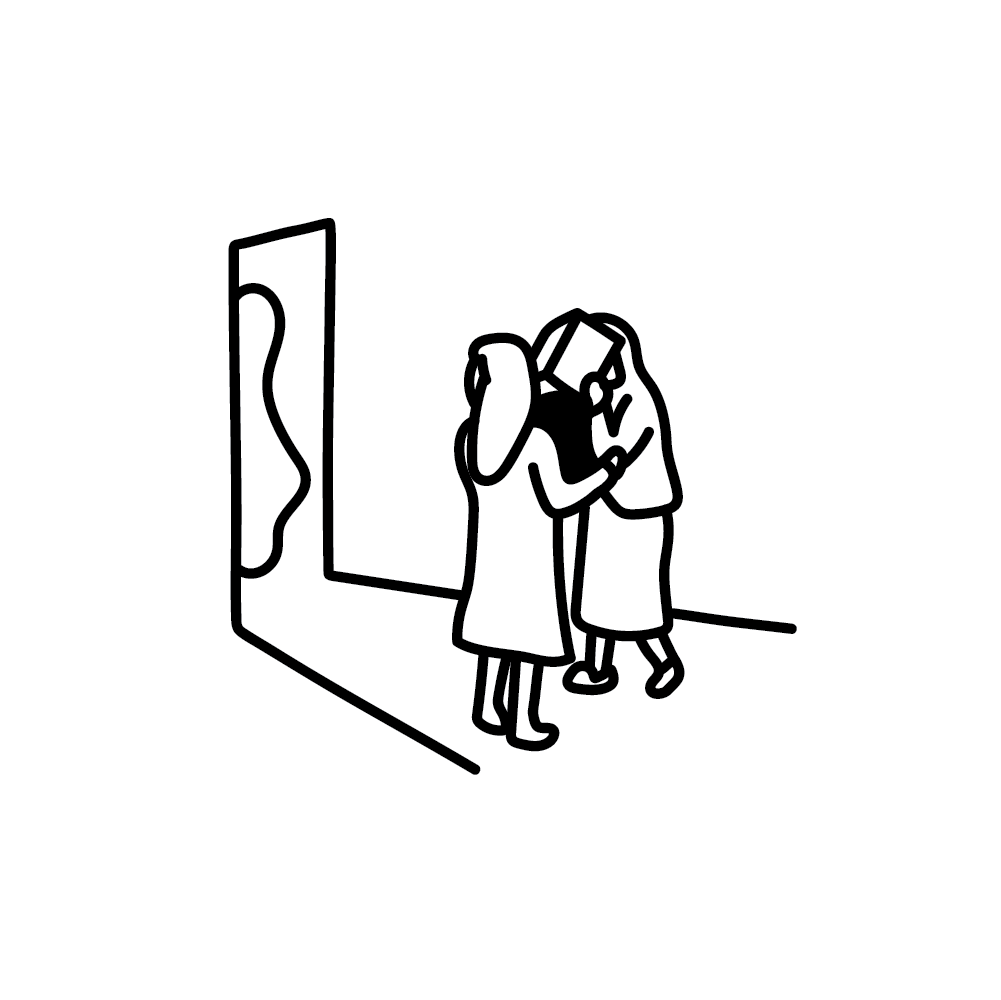
« With this moon, » Silvia said, « everyone in my village will go out and sing. » Because of the shutter, they could see only a narrow rectangle of sky beyond the thick brown treetops of Villa Borghese.
« There are people out walking at this hour, » Valentina said softly.
« Yes, free people, » Xenia added.
They were still in the dark when Emanuela entered, and at first she didn’t recognize them; in fact, thinking she’d gone to the wrong room, she said, « Oh!… excuse me, » and was about to leave.
But Xenia called her back: « Come in, come in, it’s us. We were looking at the moon — you can turn on the light if you want. »
Emanuela stood, silent in the shadowy light. Walking through the halls, she, too, had felt a desire to look out; but the big windows were barred and locked.
« What did you come here for? » Silvia asked.
Emanuela was puzzled for a moment, not knowing if the words were addressed to her, but the silence of the others made her certain. Resent fully she answered: « Xenia invited me, and Valentina said I should come up to 63. I’ll leave immediately. »
« Silly! I meant what are you staying here at the residence for? »
« What about you? »
« I’m studying. But you can live without doing anything, so why didn’t you stay home instead of coming here to eat cabbage soup? »
Emanuela, as if apologizing, said: « I couldn’t. » And, feeling that they were all waiting for further explanations, she added: « My parents are traveling. In America. »
« In America? » Xenia observed. « They have a lot of money. »
« Now I’m starting to understand, » said Silvia.
« In America… » Valentina repeated, looking at the window, where the curtain was swelling in the night breeze.
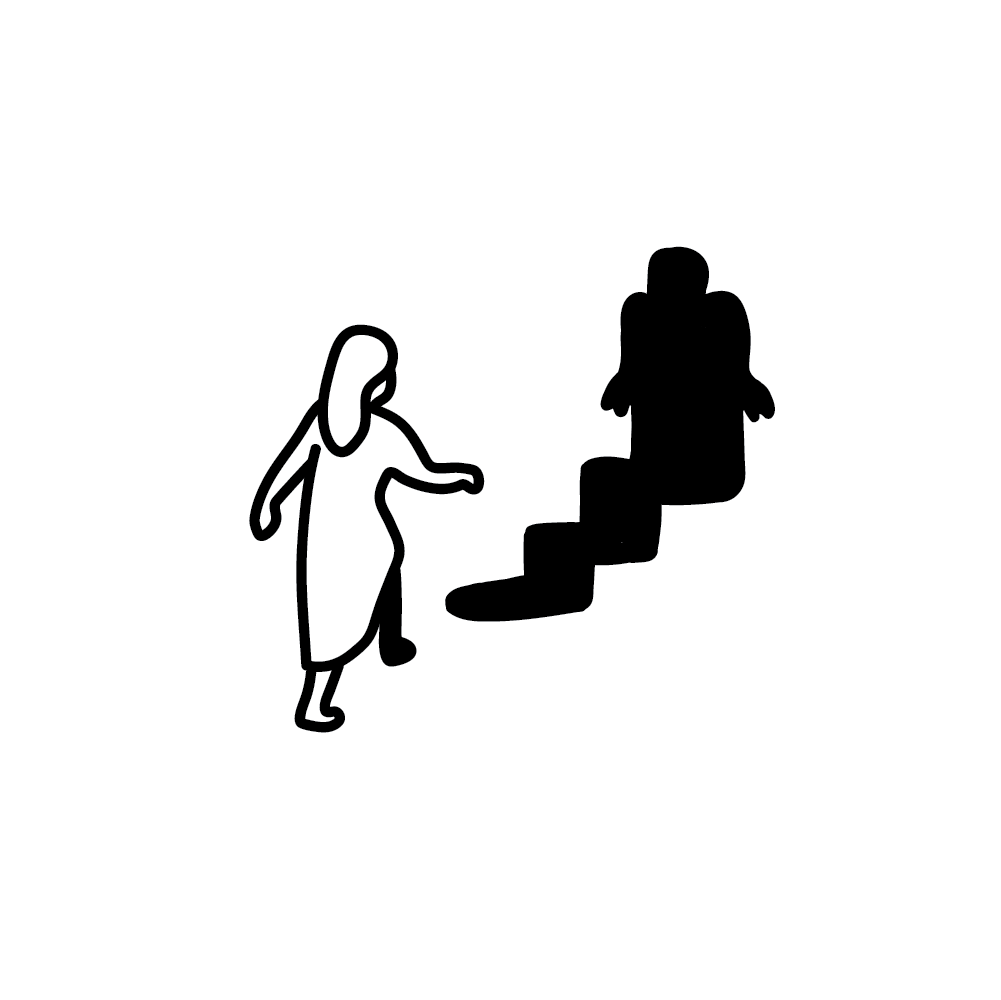
Hearing the sister’s voice, they all stirred. They turned on the light, closed the shutters. A voice made monotonous by habit was passing through the halls, crying, « Lights!… Lights!… » And the « i » was prolonged like a lament.
Anna moved the chairs, bringing them closer to the table. Valentina took an oil lamp from a shelf that held a little of everything.
« What are you doing? » Emanuela asked her.
« Didn’t you hear? She cried ‘Lights.’ »
« Why? »
« Well, you’re on the first floor, like Milly; you pay more, but they don’t turn off the electricity. After ten, if we want to study we have to arrange things like this. In a moment this floor will be dark. »
« And the halls? »
« Those, too. »
« Why in the world? »
« Because light costs money and the nuns are stingy. »
« Misers, » Xenia specified.
Emanuela asked: « How will I get downstairs? »
« You’ll learn to walk like us: groping your way. Or we’ll lend you a candle, » Xenia answered. « Now we’re going to study. You take a book, too; wait, I’ll choose something suitable. Here, take this: poets of the dolce nuovo. Okay? But sit and pretend to be studying, otherwise she’ll send you to your room. »
« Who? »
« Take that stuff off your mouth, » referring to her lipstick.
Before Xenia could answer, the door flew open as if pushed by a gust of wind. A small nun appeared in the doorway; she was thin and pale, and wore thick lenses that magnified her lashless eyes. The girls began to laugh mockingly: « Sister Prudenzina! Sister Prudenzina! » She examined the room carefully, trying to discover something unusual, or guilty — she even looked under the bed — all without moving, her hand on the door knob. Emanuela reminded herself that, days before, when she arrived at the residence, that same sister had said to her: « Take that stuff off your mouth, » referring to her lipstick.

« What are you doing up here? » the sister asked her. « I’m turning off the lights here: go to your room. »
« No, Emanuela’s staying with us, she has to study. Go, go on, Sister Prudenzina, guardian of the night. You know what we call you? The light in the fist. »
While the others laughed, Xenia went to the door to harass her. « Turn the lights off, go on: tonight we have the oil lamp, tomorrow, if we don’t have enough money, we’ll have candles. But we’ll go out… »
Silvia interrupted her: « Quiet, Xenia, tonight we’re rich, there’s the moon. »
« Yes, there’s the moon. You can’t turn that out, right, Sister Prudenzina? Go on, try to turn off the moon, too. »
The sister went on staring at them harshly. « You naughty girls, » she said in a good-humored tone, and left.
Emanuela, astonished, turned to Xenia: « Are you crazy? You’re not in prison! Why did you do that? »
« Because she’s a witch. When I first arrived, I sometimes didn’t have money for a candle. To you it may seem impossible, but I didn’t have even that. And she never offered me so much as a stub. »
Outside they could hear the cry: « Lights! » The « i » was longer than usual. Then darkness invaded the room, until the oil lamp shed its generous glow on the table, on the books.
Anna said to Xenia: « Calm down now, in a few days you’ll be done: think about preparing, instead. »
Emanuela found her book open to a sonnet by Guido Guinizelli. She had no desire to read. « I wonder why she gave me this particular book… » she thought. She observed Xenia, and the others, who were already studying, backs straight, and lowered her eyes to the book so they would think that she, too, was studying. She would like Silvia to believe her. From time to time she looked at her furtively: but Silvia was sleeping, her body a black patch on the white bedspread.

Every night Emanuela resolved, « I won’t go up, » afraid of returning to her room alone. She had never dared ask for a candle: the others wandered like sleepwalkers in the darkness of the halls, the stairs. They avoided the corners out of habit, they knew by heart how many steps there were between one floor and the next, and they went up and down counting them: one, two, three, four…
And yet, when the time came, she joined her new friends, who gathered in one room or another: all the rooms the same, except for their smell. First they talked and smoked, although it was forbidden, then they studied. Now Emanuela, too, studied every night.
Seized by the fear that her hand would meet a slimy, cold body.
But when she left, after a tranquil « Good night, » she was plunged into darkness. The blood burned her veins, causing a surge of damp heat to rise to her neck, her ears. She started walking only because she worried that her friends would open the door and find her still there, stunned by fear. She walked lightly, so that her footsteps wouldn’t raise an echo between the high walls. « Hall to the right, hall to the left; and if a dead man should appear? Here are the stairs, one, two, three, four… and if, suddenly, a cold hand rested on my shoulder? Here’s the landing, foot forward cautiously, here’s the new flight of stairs, one, two, three, four… » She held her arm out in front of her to be sure that nothing was coming toward her, trapping her. Then, seized by the fear that her hand would meet a slimy, cold body, she immediately pulled it back. She stopped, eyes wide in the shadows. She felt a cry of horror rising from all her flesh, and her throat turned dry, suffocating her. Her heart seemed to be bursting in her chest. To help herself she tried persuasion: « I’ve done nothing wrong, nothing wrong. » Then she remembered the lie, that terrible lie. She should have talked to the girls, said: « I’m not what you think, I’m betraying your trust. Do you know who I really am? Do you know the story of Stefano? I’ve told you a pack of lies.’ I’m part of their group, I know everything about them — and with the others they’re so reticent — while they know nothing about me. On my birthday, there was a big bouquet of flowers in my room: they hid behind the door to witness my surprise. Then they came in with a big to-do, kissed me. They love me, but whom do they love? Who am I, really? Yet I’m not doing anything wrong, nothing wrong. »

In this certainty she began walking again; but, entering the last hallway, she always seemed to hear a footstep or a creak. Flattened against the wall, she didn’t dare go on to her room. « Certainly I’ll find him there, white as a ghost, and he’ll grab me, strangle me. »
She calmed down only after closing the door of her room behind her and turning on the light: she saw the nightgown laid out on the bed, the books, the photographs. Her forehead still damp with sweat, she said to herself: « What an idiot. Spirits don’t exist. Milly’s sleeping on the other side of the wall. »
Milly was studying music. She had a heart ailment, and she sat in a chair to study. Sometimes she didn’t come down to the refectory. « She’s not well, » the nuns said, shaking their heads. One day Emanuela heard the full, slow sound of the harmonium rising from the courtyard. The girls were all out: some at the university, some at the library. She had stayed in her room, lying on the bed thinking. It couldn’t be a sister: it wasn’t sacred music, it was a lied. Surprised, she looked out into the courtyard, red with Virginia creeper, and saw two windows open in the sacristy. Soon afterward she went down to the chapel. No one. Finally, venturing behind the altar, she saw Milly sitting at the organ: she recognized the long blond braids on her shoulders. They were neighbors but had never exchanged a word.
Hearing her, Milly turned suddenly, startled.
« Don’t stop, » Emanuela said.
The other, her face red, asked: « You’re the one in 28, right? » And, to let her know that she, in turn, had overheard her, she added: « Last night you were crying. » Then, signaling her to come closer, she resumed playing.
Now, waking, Emanuela would knock on the wall, and Milly, who had been studying for a while, was quick to knock in response. Milly had always kept to herself; but now she sought out Emanuela, inviting her in: she told her about herself and the reason she had left Milan, where she lived with her father.
« I was in love with the sound of the organ I could hear at the vespers service in San Babila. One night I got up, left the pew, as if I were going to confess: instead I went up a little wooden staircase and found myself in the organ loft. Have you ever been up there? The music is deafening. The organist was gray, all gray, and he wore black glasses. A blind man. But I had seen his hands! So every night I sat next to him while below the people sang. Then they left, the lights went out. Going down, he placed his hand on my shoulder. »
Do you know Milan? The Giardini? You should go.
She was staring into space, and, because her eyes were very light, she, too, appeared blind. « One morning in May we went to the Giardini Reali. Do you know Milan? The Giardini? You should go: there’s a pond with a small temple and immense trees all around. They say that Foscolo went walking there. My companion saw nothing, but I told him: ‘Now the sky is all pink’ or ‘It’s dark now.’ As soon as Papa found out about our meetings, he made me come to Rome. But I’m not unhappy here: I can play the harmonium and write to him with that device there, which is all holes, in the braille alphabet, made just for blind people. By now I can write well, and he reads my letters by running his fingers over them, like this, see? » She touched Emanuela’s fingers lightly with her own.
That night Milly was in her chair, studying; and, seeing Emanuela enter panting, close the door, and lean against it, exhausted, she asked apprehensively:
« What’s wrong? »
« I’m scared in these halls at night. I’m afraid there’s someone waiting for me in my room and I don’t have the courage to go in. Sorry, I’m kind of unnerved. » She sat down on the rug in front of Milly and looked at the open book she was holding. « What are you studying? »
« Harmony. Listen, Emanuela, give up going there at night. »
« I can’t, » Emanuela answered.
She rested her head against Milly’s knees and, letting her caress her forehead, her ears, her hair, she calmed down. In her own room she was gripped by memories: letters locked in the drawers, photographs, clothes reminded her of past days and events. Her recent friendships, instead, attributed to her another personality that she wore like a new dress.
« I can’t do without it, » she repeated. « I feel shut up, imprisoned, I don’t know how to explain, I can’t take it anymore. »
« It’s like that for everyone at first: there’s no air. For me it was different: I was used to living submissively. You don’t know my father and it would take too long to tell you. I breathe better here, even shut in. But you… You shouldn’t spend so much time alone in your room. Go out, go with your friends to the university, go for a walk. I’d go with you, but I’m not well yet. You should go out with Xenia; or with Vinca, who takes everything easily. If instead of coming to me you went to Vinca’s room, you wouldn’t cry. » But Emanuela shook her head: no one could help her, not even Vinca.

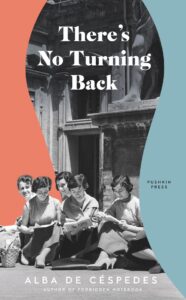
There’s No Turning Back by Alba de Céspedes was translated by Ann Goldstein, and is published by Pushkin Press. Forbidden Notebook and Her Side of the Story are also available from Pushkin Press.